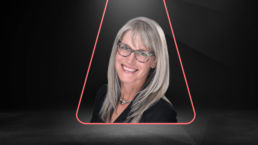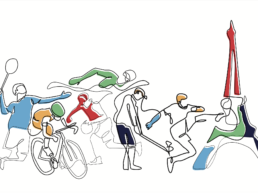Welcome to Redtorch’s She Moves The Game Spotlight Series, where we shine the light on the incredible women working in sport (find out more here).
Kimberly Coats, 2022 BikeBiz Woman of the Year and one of the 2023 50 Most Influential Americans in Cycling, is the glue that holds Team Africa Rising (a nonprofit organisation that promotes and supports the rise of cycling in Africa) together. From championing young cyclists to fundraising for the team, she fosters a supportive culture of inclusion, collaboration, and high performance.
We had the opportunity to chat to Kimberly about her incredible career journey and the evolution of Team Africa Rising, its focus ahead of the World Championships, and what she thinks the future holds for women’s cycling.
Can you tell me about your current role at Team Africa Rising and the work you do?
I’m CEO of Team Africa Rising although I like to call it Chief Everything Officer because I do anything and everything! My job involves managing logistics, setting up training programmes, coordinating flights, and making sure everything runs smoothly.
Training camps in particular involve lots of planning and coordination. For example, we’re in a 4–6-week training camp block because we realised that the riders need good food and sufficient rest when they’re training. I’m currently organising multiple training camps, which requires me to do anything from hanging up laundry to helping train our two new cooks.
In addition, I fundraise, apply for grants, and do all the marketing alongside Jeremy, one of our volunteers. My background is in business; I used to own restaurants and have worked as a business development manager for a large food distribution company, so I’m used to doing lots of things at once!
Could you tell me how Team Africa Rising was formed?
Team Africa Rising used to be known as Project Rwanda. Tom Ritchey, grandfather of the mountain bike, went to Rwanda on a personal trip around 2005–2006. He’s a bike builder and inventor, so when he saw coffee farmers struggling to get their coffee beans to the wash stations and markets efficiently, he invented an indestructible cargo bike for them to carry as much as 200 kilos of beans.
While there, he decided the wooden bikes used to transport things in Rwanda would be good to race and he asked Jock Boyer, the first American to race in the Tour de France, to join him. A rider named Adrien Niyonshuti won the race and went on to become one of the most famous cyclists in Team Rwanda and a three-time Olympian.
After going back to the States, Tom convinced Jock to set up a team so he went back to Rwanda. Jock was supposed to stay three months – he finally left ten years later. There were around five riders at the start, one of whom was Adrien Niyonshuti.
In 2009, I travelled to Rwanda to help organise and put systems in place. Things started to take off, but the cargo bike project was floundering because it was too hard to raise money. I remember saying, ‘We’ve got to spin off into our own non-profit,’ so that’s what we did – we put the non-profit registration fees on a credit card and I took a job with World Bicycle Relief in Kenya for 10 months so that I could pay for the team.
We worked in Rwanda until 2017 and then began an 18-month transition to turn everything over to the Rwandan government, to the Ministry of Sports. On returning to America I felt there was too much momentum to leave things in Rwanda as they were so I applied for another grant, got it, and kept going.
The grant – based on us forming continental teams and racing in Europe – started in 2019. Then Covid hit, so nobody could travel or do much. That’s when Team Africa Rising pivoted to the virtual platform, thanks to partnerships with the amazing teams at Wahoo and Zwift.
I am very proud that our non-profit has built up a strong reputation now within the industry and globally for getting stuff done. We talk to the UCI, the World Cycling Center in South Africa, and all major publications, and due to this, the federation president of Benin reached out and asked for help. That’s how I ended up here in Benin and it’s been great ever since.
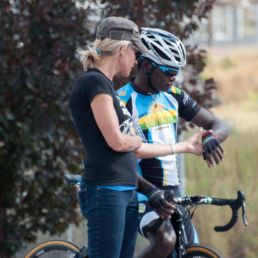
What have been the most significant milestones or achievements in your career so far?
That’s such an interesting question because it’s always changing – the biggest moment was probably the 2012 Olympics. We had been in Rwanda since 2009, and in 2010 the country held the Continental Championships, a selection race for the 2012 Olympics. Adrien had a good shot at winning – he was racing for MTN (which would become Team Dimension Data) at the time and doing extremely well.
As it was held in Rwanda, we had everything stacked in our favour. But Adrien had a mechanical issue and didn’t get selected for the Olympics. We knew he had one more shot in 2011 on mountain bike so he went to the UCI African Continental Championships in South Africa, raced and qualified! He became the first Rwandan to qualify in cycling for the Olympics. Although he competed in road cycling at Rio 2016, another mechanical problem meant he couldn’t finish the race.
But what’s so rewarding is that Adrien did make it despite all the hardships. Adrien once told us, ‘If you leave, I’m quitting.’ We stayed, Adrien kept racing, we kept building. Adrien retired in 2018 and he’s now the Benin national coach. The beauty of this is when all these first-generation guys like Adrien, Tsgabu Grmay and Natnael Berhane retire, they’re coming back to help the next generation. That’s huge for me because it shows sustainability, which leads into the whole culture of cycling on the continent.
In 2009, there were only 15 African countries ranked on the UCI Africa Tour rankings. There are 54 countries on the continent. Today, there are 22 countries with points. In 2009, there were only 77 African men with points on the UCI Africa Tour. Today there are 243. What’s most remarkable is that back in 2009, the women’s rankings only had 4 African countries with UCI points. Today there are 18! It clearly shows how much professional cycling has grown on the African continent.
It’s still not enough but is definitely moving in the right direction. It’s like that saying: The tide raises all boats. We all have to work together if we’re going to grow cycling on this continent. Not one organisation, rather a combination of organisations like ours working with UCI and other partners on the ground.
Of course, the highlight is getting the World Championships in Kigali in 2025: if Team Rwanda hadn’t started in 2007, there would be no World Championships on the African continent. I can literally say that they inspired an entire generation of cyclists. It’s going to be thrilling to see a peloton that is diverse and full of awesome riders from across the continent who are finally getting a shot in races they should be at.
Could you describe any challenges you may have faced in your career as a woman in the sports industry, and how you have overcome them?
There are several. In a nutshell, you face the challenges of being a woman in a typically male-dominated industry and then you tack on cultural issues. I was the sole woman in most industry situations and professional settings the whole time I was in Rwanda. I’d be at a table with only men; it’s very tough and I’ve gained a really thick skin. I kept thinking, ‘These guys in this meeting aren’t listening to me. I know what I’m doing. I’m a Level 2 cycling coach for USA Cycling. I’ve been in the industry for years.’ I would still get talked over, and most women have probably been there.
I had been doing reports every month for the Rwandan Ministry of Sport and Rwandan Cycling Federation trying to prepare them for the takeover. My reports were really in-depth: how many camps we ran, how much it cost us, what we spent the money on, what parts are needed, what invoices were outstanding. There would be silence every time I sent the report. Jock used to say, ‘Oh, it’s because you don’t speak French.’ But after we left, I told him we needed to do another report and helped him write it. Remember, I received no feedback for 11 months of doing the reports. He sends one out and – I kid you not – within 30 seconds he gets feedback! I recall it so clearly because he turned to me and said, ‘I get it, I get it. I see you. I get it. It sucks.’ That’s just a day in the life … Honestly, it’s every day still. I had one guy explain to me the whole Zwift platform even though I’ve been using it for years.
It’s challenging to balance cultural issues, as women are seen differently in Africa to how they’re seen in the West. I have a friend who organised and took part in a race in Sierra Leone. After the race, she sat with the director and he asked her to go and get him a sandwich. I would have felt able to say no. But the problem is, how do I translate this to all the women here when it’s so far outside their culture? I hope it continues to get better for younger generations.
I hope that through the work we’re doing, we can help to instigate change. We don’t teach cycling in isolation, we teach life skills. All our young men here know how to respect women. They know that women are not there to serve them and that women are athletes too. The men cheer the women on when they’re racing and vice versa.
You mentioned a truly shocking statistic from Cycling Weekly that 71% of women are thinking about leaving the industry. What are the biggest challenges facing women in the cycling industry today?
To be honest, when that article came out, I wasn’t surprised.
There are so many sensational women in the industry, and we need more discussions with them. For example, I love Kate Veronneau (Director of Women’s Strategy at Zwift), she’s fabulous. I reached out to congratulate her when we were up for the same award. As women, it’s difficult because the jobs can be few and far between in the industry, but we don’t need to fight each other. We need to help and support each other. Kate is like my biggest champion.
We must continue to tell stories about amazing women – for instance, we had this fabulous mechanics training class in Rwanda and one of the women – Sandrine Uwayezu – did really well. She went on to become the first woman to work for a team (Illuminate) at the Tour of Rwanda where she did a stunning job. The more we can show those successful women out there, the better.
One challenge is that there are so many men in the management of cycling in Africa – we need more women here. The whole time I was in Rwanda, I fought for a woman’s Tour of Rwanda. Do they have it yet? No. But there has to be somebody that starts and keeps banging the drum.
I work with Deena Blacking from The Cyclists’ Alliance, too. She’s been super helpful in getting a couple grants for the team.
To conclude, it’s going to take more of us sharing stories of incredible women.
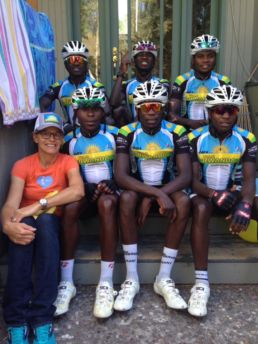
It’s fantastic that TAR pushes for equal pay for races on the African continent as well as committing for all African Federations to invest in women’s cycling. How do you think this landscape will change over the next decade?
It’s going to take a long time on this continent, yet I remain hopeful. I love that they’re televising women’s races more; that’s so important because representation matters. Whether it’s a black female cyclist seeing a black woman like a Teniel Campbell racing in the pro ranks, that matters to them because it’s a case of, ‘If they can do it, so can I.’
It’s been great seeing the team CANYON//SRAM Wildlife Generation. They have a Rwandan rider (Diane Ingabire), a Ugandan rider (Florence Nakaggwa), an Ethiopian rider (Selam Amha Gerefiel), and a Nigerian rider (Ese Lovina Ukperesaye). That’s four black African women on a team which is remarkable. I know Adam Szabó (Team Director at CANYON//SRAM Generation) well. He’s phenomenal and spent time at the UCI, so he worked with the UCI to bring developing nations to Switzerland.
I’m extremely hopeful about the future. The future for women is really strong and as long as those on the African continent continue to see that, and we have teams like CANYON//SRAM investing in the development of African riders, we can definitely get somewhere in 10 years.
I know that Team Africa Rising have developed a virtual training and racing program with hundreds of riders now online across Africa (thanks to the work of Team Africa Rising, Zwift and Wahoo). Could you tell us about this, specifically around women’s cycling?
We use Zwift for racing and Wahoo for their great fitness programmes like yoga and strength training. These platforms have been huge for African cycling and help democratise the sport for us. Some of the kids here live in areas where the roads are so dangerous that they can’t get out and ride, so using Zwift means they can do it on here. It also means that young girls can cycle and not worry about their safety. School often goes from 7am until 6pm so I’ve got kids who show up after school in the dark.
We recently did a big fundraiser and raised money to buy 27 SCOTT bikes for Benin. It’s awesome because we have a room set up and the kids come in, pick their bike, then we adjust it, and they ride.
This allows us to test riders and know where to focus our limited resources: that’s been so important. The one major challenge we face is that technology is moving so quickly. It was great getting on Zwift and racing and we’re delighted to be on the World Tactical Racing League on Zwift for the first time ever. However, we’ve discovered that if you make it to the finals, you have to have a secondary power source to prevent cheating. Equipment is so expensive and it’s very frustrating having to go and buy power pedals at $1,000 a pop.
Zwift and Wahoo have helped in so many respects but it’s hard to keep up with the changing technology. Technology allows us to make better decisions on who we spend time with, but I wish we had enough equipment for every kid.
It’s amazing that they have the opportunity to be involved with cycling yet can be involved in aspects other than racing, such as engineering or coaching.
Yes, we did our first TTT (Team Time Trial) on Zwift today and it was fabulous. The kid who set it up is a university student who got interested in cycling after the federation visited his university. He discovered that he loved everything about Zwift and now runs all of that for us.
He’s not a rider but he’s somebody incredibly valuable to us and to the riders. We know that there’s a whole segment of riders within Benin who won’t become professional but would make spectacular coaches, for example. I’ve started giving some of them responsibilities, such as leading classes. Salami is taking three Benin women to next week’s Tour du Lunsar in Sierra Leone.
To let riders age out and disappear would be a massive loss. It’s not merely about developing professional cyclists. It’s about developing the whole infrastructure around cycling to support families. A lot of these kids will have long-term jobs with us.
It’s very exciting that the cycling World Championships will be in Africa in 2025 – what is Team Africa Rising’s focus in 2024 and during the lead-up to the Championships?
I was recently notified TAR was given a new grant to enable us to take riders to race in Europe over the next couple of summers, because that’s where they learn quickest. They get a real sense of where they’re at in comparison to the competition.
The goal is for African cyclists to dominate the competition. We’re really focused and I’m excited to see what the juniors can do. There are three to four juniors here in Benin right now who could be in the top 20, if not the top 10.
We need to showcase African riders doing well because that will open the door long term to professional contracts. And the only way to do that is to take them to races in Europe. We don’t have enough races here and those we do have are not at a high enough level.
There’s so much that goes into being a professional cyclist, and they’re already light years behind simply because there aren’t as many opportunities for them in terms of where they come from. I want people to realise the massive journey (physically and mentally) these riders embark on just to get to the starting line. And the little bit of money they make on the national team gets spent on their families. They don’t have families with credit cards.
If we can prepare the riders, if we can expose them to Europe, expose them to different situations, they’ll be ready for Rwanda in 2025 even though they’ll need to overcome far more hurdles than the average rider.
Looking forward, what steps can be taken to encourage more women to get into the cycling industry?
Number one, more women need to be at the top levels of the sport. They need to be in management, in federations, in the rooms where decisions are made, because everything else is dependent on that, especially in Africa. If only men take the decision, it’s likely we’ll continue not to have any women’s races.
Federations carry a lot of weight in cycling in Africa and it’s mostly men working for them. Women have to be at those tables and if they’re not, it’ll continue to be a struggle. It’s also about bringing retired female riders into coaching and team management positions.
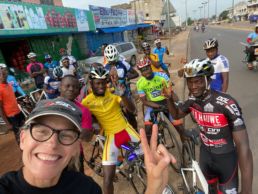
Do you have any key resources or women in sport who have inspired you that readers could look into?
I’ve always been in a male-dominated industry – I used to be a Business Development Manager and worked with an all-male team, and it was brutal.
That being said, I can think of a couple of things. I rely on women who are already in the industry such as Kathryn Bertine (pro cyclist, author, filmmaker, activist, motivational speaker). We have Zoom calls every so often, particularly when things feel tough. It’s so important to be able to reach out to other women who have experienced similar ups and downs. Kathryn fought for so long to get a Tour de France for women. It was funny when I was reading her book Stand Up, I saw she’d included an e-mail from me encouraging her! I was blown away. So I rely on women like that.
Shannon Galpin is another great example. She founded the Afghan women’s cycling team years ago and wrote a book – Mountain to Mountain – about her experiences. There were very similar issues in Afghanistan as I was having in Rwanda with the challenges around all-male federations.
I also surround myself with a lot of amazing men as I don’t want to discount the power of a man and how good it is to have someone who can champion you. So definitely find yourself a bunch of awesome men, too. Sometimes as women, we get frustrated by the obstacles in front of us, and we forget that a lot of great guys see the struggles we go through and will open doors for us. We should be able to open our own doors. But frankly, sometimes we need a door opened – we need to get a foot in the door.
What advice would you give to women who want to kickstart or progress their career in the sports industry?
Strangely, I’ve never thought I’d be doing what I’m doing. In 2008, I was living in Las Vegas and unhappy in life. I wrote three things in my journal that I wanted to do: something around my love of travel, to help people, to do something in cycling. I read an article that same year by Jason Gay in Outside magazine about Project Rwanda and the work being done. I was cycling with a friend and telling them all this stuff and they said, ‘Well, it looks like you’ve got to track down Tom Ritchey. You’ve got to go.’
l was on a plane to Rwanda within six months! I was supposed to be there for three months – it ended up being eight years and I’m still doing it.
People always ask, ‘How did you get your job?’ and I reply, ‘I totally made it up!’ There was no planning and I never thought I’m going to be CEO of a nonprofit organisation in African cycling. I just tried to keep my head above water for the first couple of years. I guess my advice is: be super clear about what’s important to you. Stop with all the ‘I need to make X amount of money’ and numerical goals and be real with yourself. Understand what moves you, what gets you out of bed. I still love travelling, I still love cycling, I still love helping people. That’s who I am and that’s why I do what I do.
How can readers get involved and support Team Africa Rising?
There’s a donation button on our website so all donations are welcome. £20 a month, if you can commit, makes a difference. That will pay for all the food for a week for a rider, and that matters because they don’t eat well otherwise. You can choose where you want your money to go. If you want it to go to women’s cycling, it’s going to women’s cycling.
And you can support us by spreading the word, and if you’re in a position of power or management in the industry by opening a door.
I’m sure you’ll agree that Kimberly’s work at Team Africa Rising is truly inspiring, and I hope you feel motivated to follow her advice of embracing those around you and pursuing your passion in life.
You can donate to Team Africa Rising here, find out more on their website, and follow them on Instagram, Twitter, Facebook and LinkedIn.
Keep an eye out on our website and LinkedIn as we continue to highlight extraordinary women in sport through She Moves The Game.

